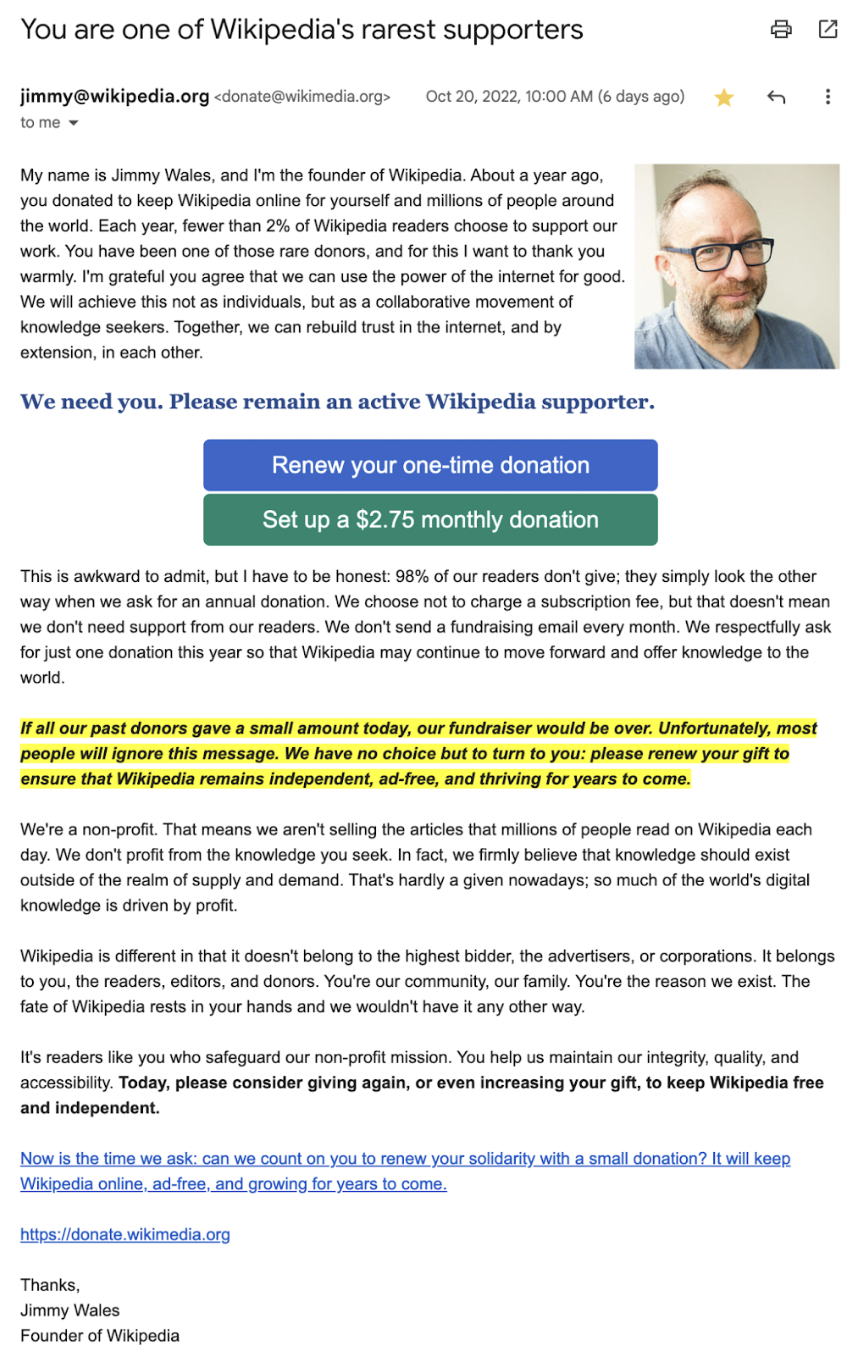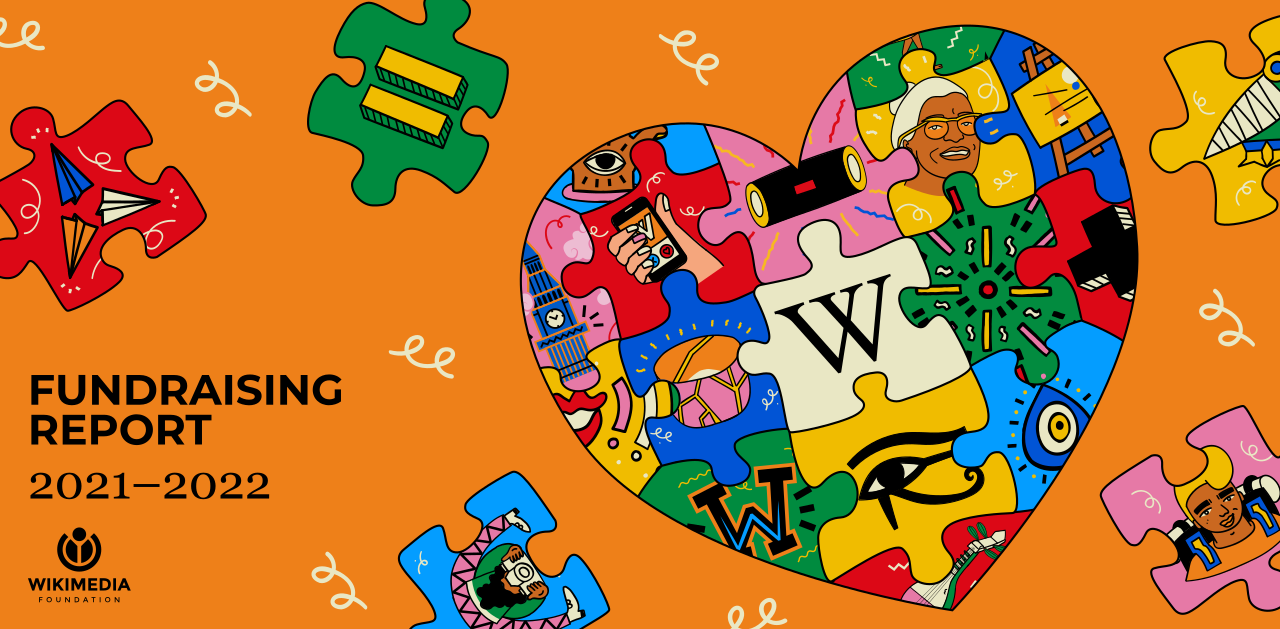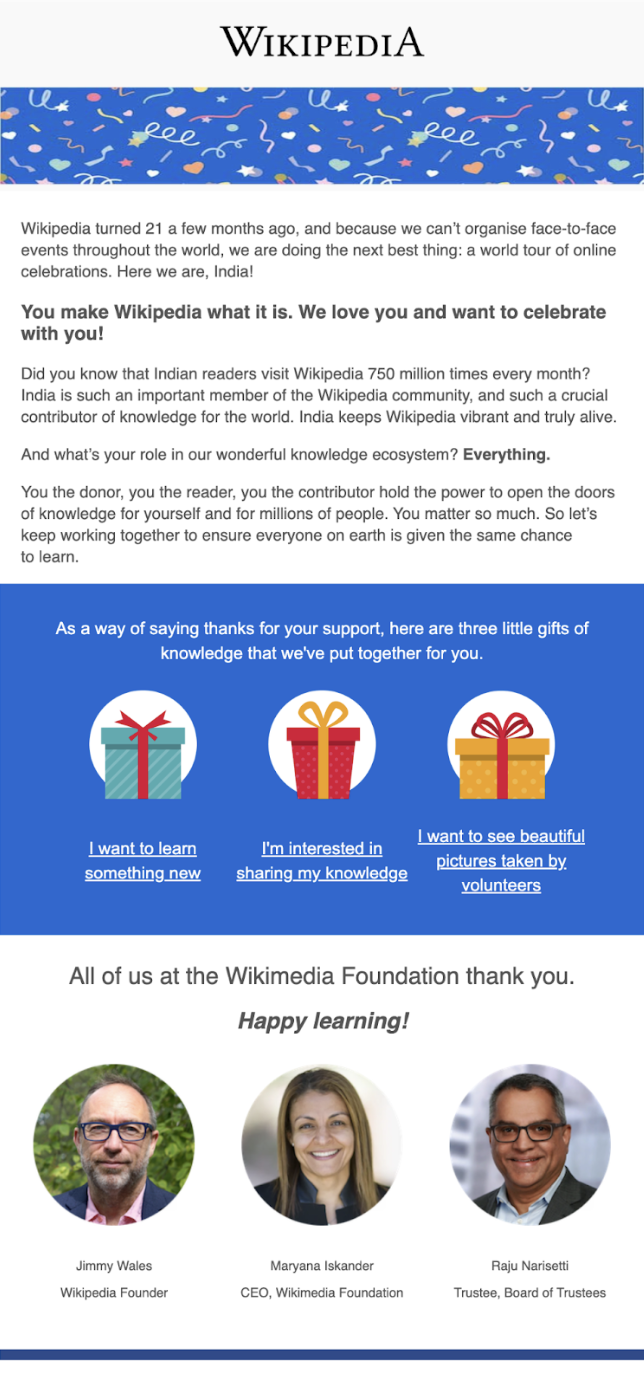Fundraising/2021-22 Report

Introduction
As you will learn in this report, the majority of funding for the Wikimedia Foundation comes from individual donors all around the world. These donations allow us to provide the world-class technology infrastructure that supports 16 billion monthly views to Wikipedia, protect free knowledge globally through legal and advocacy efforts, and support the incredible volunteer editors that have built 59 million articles across more than 300 languages. We produce this fundraising report every year to share our learnings from engaging with millions of donors around the world. This is a unique report and, as far as we know, the Wikimedia Foundation is the only major charity to share this type of fundraising information transparently with the public. The Foundation also publishes other reports to inform our community of readers, volunteers, and donors throughout the year. These include our annual report, that focuses on our impact and our audited financial report that describes our overall financial activities and financial position.
Through the actions and collaboration of many, the Wikimedia Foundation gains resilience and maintains our independence. In 2013, the Wikimedia Foundation Board of Trustees defined the guiding principles that drives our fundraising strategy to this day. The principle of “independence” speaks to the value provided to our projects by the readers who donate to the Wikimedia Foundation:
“Part of the job of the Wikimedia Foundation is to ensure that the freedom and independence of the projects is never compromised. To that end, and also because it is extremely effective, we have deliberately chosen a revenue strategy in which a large majority of the funding for the Wikimedia Foundation comes from a large number of small donors in multiple countries around the world. This model limits risk, preserves independence by reducing the ability of any one organization or individual to influence our decisions, and aligns our fundraising practices with our mission by encouraging us to pay attention to the projects’ readers.
Because the Wikimedia Foundation does not want to compromise the editorial integrity and independence of the projects, nor risk a perception that we have been compromised, we would be extremely reluctant to put advertising on the projects, or anything that might be perceived as advertising. We do not say that would never happen, because if it were a choice between shutting down the projects and accepting advertisements we would consider doing it. But we think this is highly unlikely, and would only be considered in the gravest of circumstances.”
Nearly a decade later, our donors throughout the world have kept Wikipedia independent and ad-free with their continued and generous support. Thanks to our incredible community of volunteers and donors, Wikipedia is thriving, continuing to grow, and on stable financial footing – which is critical as the world enters turbulent financial times. We thank our donors for the renewed trust they place in us each year, and for keeping us on a path to “A world in which every human being can freely share in the sum of knowledge.”

Key Stats
Donation Totals by Continent

If you would like to help translate fundraising messages or provide feedback on how we localize our messages in each region where we fundraise, please email fr-localization@wikimedia.org to get involved.
Donation Totals by Sources
$165,232,309 USD raised from over 13 million donations
Our fundraising revenue increased by 10% from the previous year.
Our average donation size decreased by $0.28 USD.
Key Stats: English Campaign
Our English language campaign fundraiser — the most extensive campaign we run each year — spans six primarily English speaking countries: Australia, Canada, Ireland, the United Kingdom, the United States, and New Zealand. This campaign generates more than 50 percent of all revenue earned per year.
At the beginning of our fiscal year in July, we run weekly banner “pre-tests” (test messages on English Wikipedia that ask readers to consider making a donation) in preparation for this important campaign. These tests help us improve our systems and processes to manage a high volume of donations, enhance the donor experience, mitigate financial risk, and provide more readers with an opportunity to donate.
Online Fundraising English Campaign
Share of Revenue by Source
Fiscal Year 2021-2022

Online Fundraising 2021-22
The Wikimedia Foundation has always been primarily funded by individual gifts from readers around the world. Most donors start as Wikipedia readers who happen to be on the website when one of our fundraising messages is live. Our fundraising campaigns seek to educate our readers about why Wikipedia is different from the for-profit websites they visit that rely on advertising or subscriptions and why their role as a donor is critical for Wikipedia’s independence and growth.


Across our emails, banners on the web and in apps, we raise awareness about Wikipedia's unique value in the world and about the need for continued support under our reader-supported revenue model. We explain our free knowledge mission and give gratitude to the millions of editors, readers, and contributors who keep our movement thriving. We use feedback from readers, donors, community members and the wider internet to continually improve these messages and better connect with readers about Wikimedia’s global impact.
Introducing Maryana Iskander, our new CEO, to our online audience
Our new Chief Executive Officer brings years of senior leadership experience in nonprofits around the world. Before joining the Wikimedia Foundation in 2021, Maryana served as Chief Executive Officer of the Harambee Youth Employment Accelerator in South Africa for nearly a decade.
One of Maryana’s first initiatives with the Fundraising team was to lend her voice for a new Thank You email to donors. The new email focused on her appreciation for our donors and how their support enables us to advance knowledge equity around the world. This will be the first of several donor communications from Maryana, as we continue to explore ways for her to connect with all of our donors.
Cultivating our Monthly Donor Program
"I continue to pay a monthly contribution to Wikipedia of £5, and am constantly grateful for the high-quality instantly-available information it provides." - Donor in the UK
Individual readers giving single gifts provide critical support for our global fundraising program. We will always offer the ability to make a single donation to our readers and work constantly to expand opportunities for people to make gifts that are appropriate for their circumstances and cultural context.
In addition to our donors who provide one-time gifts, we have realized that there are many donors around the world who are interested in providing regular support to the Foundation.
As we’ve begun to promote our monthly giving program, we’ve seen a significant rise in readers who consider making a monthly gift instead of a one-time contribution. This kind of ongoing support is vital to our planning and preparation for the future of the organization.
This year, more than 645,000 people around the world were monthly donors to the Foundation, an increase of 31.3% compared to the previous fiscal year.
We promote the importance of monthly giving in our online banners and donation pages:
As our monthly donor base grows, we strive to continually improve the experience of these important donors. As an initial experiment, we sent a group of these donors an email to inform them that our fundraising campaign was about to start, and included information on how to avoid interruptions from banners on Wikipedia. We will continue to innovate to keep monthly donors engaged and informed.
New Fundraising Campaigns
Our resilience as an organization is bolstered when readers around the world have accessible opportunities to join our community of donors. In 2020, we reached a significant milestone when we ran our first on-Wiki fundraising campaign in India in many years. In 2022, we contacted these donors through email for the first time, and introduced them to the Foundation and Wikimedia movement, and to thousands of supporters. Our “pre-campaign” email messages celebrated our mission and highlighted the movement’s work. We look forward to engaging readers further in India.
Image of India pre-fundraiser email:
Payments Improvements
Our Donation Processing Team works to improve and expand our payment options in different countries, ideally providing a seamless giving experience. We currently support donations through 29 unique payment types in 28 currencies around the world. There were several accomplishments the team made this year that allowed more donors to give online. This included the addition of Apple Pay across many countries, Bank Transfer (Stitch and ACH) locally in South Africa, and PIX in Brazil (which yielded over 63% of donations in Brazil). Apple Pay comprised over 10% of all online donations during our busiest season. We underwent continuity planning and execution around our payment processing infrastructure to ensure no technical disruption while meeting our fundraising goals. We will continue to improve our payment offerings in the coming year so that more people have the opportunity to support our work.
Wikipedia App and Portal Banners
In addition to the fundraising banners across Wikipedia articles, the Foundation runs fundraising banners on the Wikipedia App as well as the homepage portal, found at Wikipedia.org. These channels are important places for us to encourage more readers to consider donating.
The introduction of Apple Pay to iOS users last year proved extremely popular in our App campaign, accounting for ⅓ of all App banner donations.
Key results from Portal banners:
In fiscal year 2021-2022, we ran portal banners in Australia, Canada, France, India, Ireland, New Zealand, Sweden, the United Kingdom and the United States. Altogether, they totaled $1.32M USD. We also now feature a permanent donation link on the “portal” footer, visible on wikipedia.org.
Image of portal donation link:

Major Gifts and Foundations
Major donors are those who give $1,000 USD or more to the Wikimedia Foundation, or who give in other specific ways, such as through donor-advised funds, payroll deductions, and matching gifts. In the 2021-2022 fiscal year, our Major Gift donors gave $20.8 million USD,[4] which was 13% more than the previous year — an increase that helped accelerate the Foundation’s mission. All told, Major Gifts donors comprised more than 18,000 people: over 2,700 people gave $1,000 USD or more, while 16,000 others contributed through donor-advised funds, payroll deductions, and other methods that fall under Major Gifts.
Many donors choose to be recognized on our Benefactors page, which is a public expression of extra thanks for those Major Gifts donors who have supported the Wikimedia Foundation.
Matching Gifts
More than 44,668 gifts were made through corporate philanthropic programs this past year. In these matching gifts and payroll deduction programs, employers match employees’ individual gifts to the Wikimedia Foundation, doubling or even tripling the original donation amount.
These gifts totaled $1.76 million USD and included employee-generated gifts totaling more than $428,000 from Google, more than $207,000 from Microsoft, and over $121,000 from Apple.

Wikimedia Endowment
The Wikimedia Endowment, which the Wikimedia Foundation established in 2016, is the safekeeping fund that helps to ensure the future of Wikipedia and other Wikimedia projects. In the 2021-2022 fiscal year, donors gave $13.5 million to the Wikimedia Endowment in a range of ways — including direct donations, realized bequests from individuals who left gifts to Wikimedia in their wills, and Qualified Charitable Distributions, which are also known as IRA Charitable Rollovers.
Throughout the year, more than 400 people and institutions made gifts of $1,000 USD or more to the Wikimedia Endowment. This includes $2 million from the Arcadia Fund and a $1 million gift from Amazon. More than 600,000 other donors made gifts to the Wikimedia Endowment, with an average donation of $13.91 USD[5].
Also during the 2021-2022 fiscal year, 701 people made legacy gift commitments, which are an important part of the Endowment’s long-term success. Legacy giving is a way of collecting pledges for future donations, most commonly through gifts in wills and beneficiary designations. The Wikimedia Endowment has partnered with FreeWill, a free online tool to create a legal will in the United States, to make it easy for those who wish to make a legacy gift to the Endowment.
Many of our Endowment donors and legacy donors choose to be recognized on the Endowment website’s Benefactors page or as members of the Wikipedia Legacy Society.

From Our Supporters
During the 2021-22 fiscal year, the Donor Relations team responded to 177,352 donor inquiries in 40 languages from donors worldwide. A portion of these donors reached out to us to express their gratitude for Wikipedia, tell us more about why they decided to support our mission, and ways we could improve in the future. We are glad to share some of their comments below:
"Please accept my token of support, a small contribution from me. Also, please accept my heartfelt thanks for keeping Wikipedia going, for not letting it to be anyone's personal property, for maintaining its integrity, quality and its sanctity, for making it accessible to anyone and everyone across the geography. I understand how difficult it can be to not compromise and keep going especially in today's profit-seeking digital world. I can't be thankful enough." - India
"You are the number one source of everything I need to know in the world." - USA
"I am a nonagenarian academic in my 94th year, I use Wikipedia frequently in my quest to keep my brain alive. I am grateful for the information I can obtain with confidence from Wikipedia especially to be able to follow supporting references often obtainable." - South Africa
"I drive a big bus on a wee island off the west coast of Scotland, and the information I get from Wikipedia, I relay to my passengers." - UK
"It is I who would like to thank you and the many others at the Wikimedia Foundation for the gift of knowledge you provide to searching/curious minds. I further thank you all for providing a source of information to combat all the mis-information which abounds. I will keep Wikimedia in my thoughts when I am able to contribute a donation again. Thank you!" - Canada
"We often have the feeling that everything is owed, everything is possible, without always being aware of the enormous work that is offered to us. Your work is masterful, universal. A huge thank you for allowing us, indeed, without effort, to access your encyclopedia on a daily basis or nearly. Your appeal for financial support is also useful so as to remind us that we are all members of a common world, a common history. With all my wishes for the foundation, your team and yourself, many happy returns." - France
"Wikipedia is a treasure that must be defended at any cost. It is a knowledge tool at our fingertips that can be trusted and its independence is now more needed than ever. Keep up the good work!" - Italy
"I love Wikipedia and I use it daily. I love and respect all of you who work for Wikipedia. I believe myself that in the times we are living in, an independent and trustworthy source of information is more than ever the true difference between a bright future for this world and a gloomy corrupt planet heading for disaster." - Sweden
"I teach nurses and even though we may try and get them to also use peer reviewed academic journals Wikipedia provides a great opening learning opportunity for them – and I use it religiously for my own information Thank you for this excellent encyclopedia." - New Zealand
"In Chinese, we say that we can't let someone who searches for firewood for everyone freeze in a snowstorm. Really appreciate what Wikipedia does. Cheers!" - Australia

Report Talk Page
Thank you for reading our annual fundraising report. Please visit the talk page for any questions or to leave comments about the report. We are happy to share information about fundraising at the Wikimedia Foundation and look forward to your feedback. We will respond to comments and questions to the best of our ability.
- ↑ “Other” may include donations from the Wikipedia sidebar, Wikimedia Foundation “Ways to Give” page, Wikipedia app, portal banners, social media platforms, and also some checks, anonymous, spontaneous (e.g., visiting donate.wikimedia.org directly), and offline donations.
- ↑ “Chapter Gifts” refer to money raised by the two Chapters that currently run their own banner fundraising campaign, Wikimedia Deutschland and Wikimedia Switzerland. Donations received through their fundraising campaigns are transferred to the Wikimedia Foundation in order to support the wider movement.
- ↑ The amounts listed in this fundraising report do not conform to the US Generally Accepted Accounting Principles and differ from revenue reported in our Independent Auditors’ Report and Internal Revenue Service Form 990 Tax Return. Lastly, the figures represented from prior years may exclude canceled donations. This report reflects the value of gifts at the point the donation was made. Many currencies in the world have significantly decreased in value relative to the U.S. dollar in 2022. The figures represented on Wikimedia’s Independent Auditors’ Report represent the value of our assets on June 30, 2022 in terms of USD. This accounts for the difference between the financial totals reported here and those in the 990. Lastly, the figures represented from prior years may exclude canceled donations.
- ↑ Major Gifts’ fundraising total is $20.8 million USD when it includes donations under $1,000 that still fall under Major Gifts, such as donor-advised funds.
- ↑ The Endowment reimbursed $432,526 to the Wikimedia Foundation for payment processing fees related to contribution transactions.









